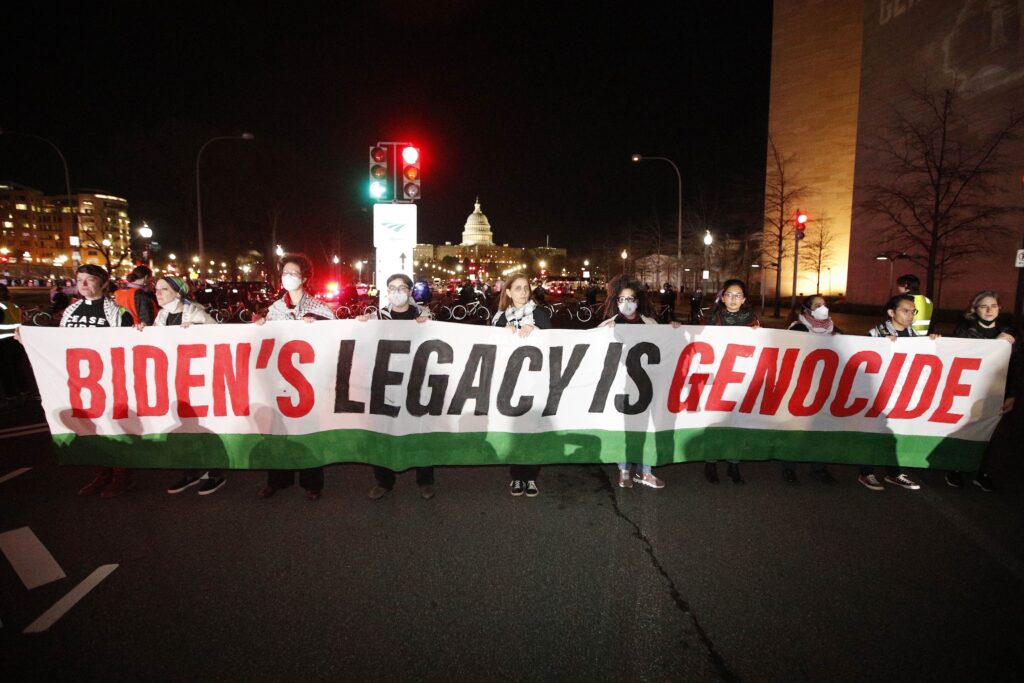“Don’t repeat this.”
For a moment, it seemed like President Joe Biden didn’t want most people to know what he was about to tell Secretary of State Antony Blinken, Sen. Michael Bennet (D-CO), and Transportation Secretary Pete Buttigieg.
“I told him, ‘Bibi … you and I are going to have a come to Jesus meeting,'” Biden said after his State of the Union address, as a CSPAN cameraman looked on. “I’m on a hot mic here. That was good.”
The exchange punctuated an escalating series of public signals that Biden’s team disapproves of Israeli Prime Minister Benjamin “Bibi” Netanyahu’s prosecution of the war against Hamas. The civilian death toll in the Gaza Strip has fueled outrage on the American Left at the potential expense of Israel’s standing among liberal democracies and Biden’s potential reelection prospects, which depend in no small part on Arab American voters concentrated in the battleground state of Michigan.
“The administration is thinking about this in terms of the political narrative in the United States and wanting to make sure that the people of Gaza are taken care of to satisfy a certain constituency in the United States,” Foundation for Defense of Democracies Senior Vice President Jonathan Schanzer said.
“This was an unabashed effort to inject the question of humanitarian assistance into the broader war equation for Israel,” he said.

Biden drew thunderous applause from congressional Democrats for his insistence that “the only real solution to the situation is a two-state solution over time.” And he used the speech to unveil a plan for the U.S. military “to establish a temporary pier in the Mediterranean on the coast of Gaza” for aid deliveries while directing a high-profile rebuke at Netanyahu.
“Israel must allow more aid into Gaza and ensure humanitarian workers aren’t caught in the crossfire,” Biden said during the address. “To the leadership of Israel, I say this: Humanitarian assistance cannot be a secondary consideration or a bargaining chip. Protecting and saving innocent lives has to be a priority.”
In parallel, Netanyahu drew fire from his right, as a center-right opposition leader faulted him for failing to use humanitarian aid as leverage “to pressure Hamas to release the hostages.” On the other hand, the relatives of Israeli hostages blocked a major Israeli highway in order to demand that Netanyahu strike a bargain with Hamas that they perceive him as being unwilling to make for fear of alienating the far-right wing of his coalition government.
“If you cannot achieve a deal now, step aside for someone who can,” the protesters said, according to the Times of Israel. “The survival of the government [cannot be] at the cost of hostages’ lives.”
Netanyahu has managed that dilemma so far by affirming his willingness to negotiate a temporary ceasefire, not the permanent halt that Hamas seeks, while also continuing the military campaign.
“Biden is apparently determined to deliver something tangible, not [merely] a ceasefire that would last a couple of weeks, but he needs partners,” a European official based in Israel told the Washington Examiner. “Netanyahu’s government — [he’s] a political survivor. … If there is a solution or at least part of a solution, a hostage deal — people are released, or at least most of them — and then there is a political process to be resumed with Palestinians about what’s next in Gaza, this would be a quite difficult situation for Netanyahu.
U.S. and Arab mediators have tried to orchestrate a package deal that would see the hostages released as part of a ceasefire and prisoner exchange — an agreement Biden has hoped to see finalized prior to Ramadan, which begins next week — but the belligerents have yet to strike a bargain.
“And there, the issue is Hamas,” Blinken told reporters Friday before a meeting with Turkish Foreign Minister Hakan Fidan. “The issue is whether Hamas will decide or not to have a ceasefire that would benefit everyone. The ball is in their court, we’re working intensely on it, and we’ll see what – we’ll see what they do. But there’s no doubt in my mind that getting to this ceasefire with the release of hostages would be a profound benefit to everyone involved.”
Hamas maintains that Israel must abandon its effort to destroy the terrorist organization, which has pledged to repeat the terrorist attacks perpetrated on Oct. 7 until the destruction of the state of Israel.
“Our top priority to reach a prisoner exchange deal is the complete commitment for the halt of aggression and an enemy withdrawal, and there is no compromise on this,” Hamas militant spokesman Abu Obeida said Friday.
The political strains of the war have begun to show on Netanyahu’s uneasy unity government, as long-term rival and current war cabinet colleague Benny Gantz made a diplomatic tour of Washington and London this week. Netanyahu reportedly was angered by Gantz’s itinerary, which was widely perceived as a not-so-subtle signal that Biden’s team welcomes him as “the leading candidate to become the next Prime Minister of Israel,” as one Israeli political reporter put it.
“Biden’s hot mic is not a sign that things are not well between the U.S. and Israel; it’s a sign that things are not well between Biden and Bibi,” Schanzer said. “There’s tension in that relationship.”
CLICK HERE TO READ MORE FROM THE WASHINGTON EXAMINER
And yet, there’s a sense that if Biden remains willing to send weapons to Israel and Netanyahu cooperates with U.S. efforts to send humanitarian aid to Gaza, a little acrimony could be the most comfortable dynamic for the two leaders.
“So the U.S. is not in a position to tell Netanyahu [what to do], and Netanyahu knows very well… because of the domestic political concerns,” the European official said. “The tension is there and both Biden and Netanyahu, they, apparently, they can still escalate the [controversy], and I think Biden doesn’t want to go that way.”

